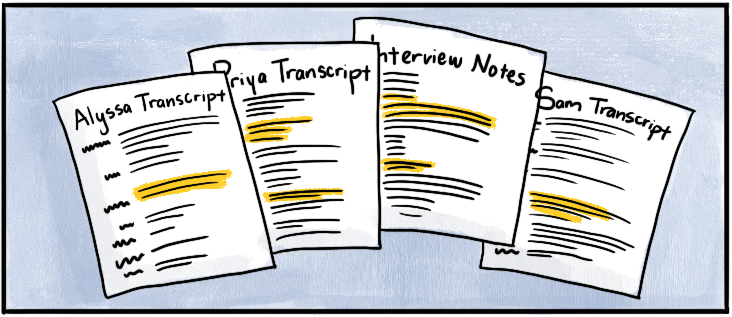Learning
From Data to Results: Power of Thematic Analysis for Dissertation Excellence

Do you want to opt for conducting a thematic analysis for your dissertation but are not aware of the intricacies of the process? You are at the right place, as this article shall serve as a helpful companion explaining to you the minute details of the process. From collecting data to deriving the potential desired results from your collected data, you will be familiarised with everything. Let’s explore the topic further in detail now.
What is Thematic Analysis?
Thematic analysis is a way of analysing qualitative data. It includes reading through certain data sets and finding the patterns in the data to locate the existing themes in the data. The data set under analysis include text, open-ended questions, group discussions, and interview transcripts. The more good your thematic analysis is, the better the dissertation quality will be.
What are the Approaches For Conducting Thematic Analysis For Your Dissertation?
A researcher is faced with numerous approaches to conducting a thematic analysis for the dissertation. The approach that the researcher should use depends on the research design of the dissertation. Following are some of the most common types of thematic analysis approaches:
Inductive Approach
The inductive approach for a thematic analysis involves the derivation of meaning and identifying certain themes from the given data. You will have to analyze the data with no existing preconceptions. The analysis is done without keeping in mind any expected results.
Deductive Approach
In this thematic analysis approach, the researcher analyses the data with certain expected outcomes in mind. This approach is based on existing research work, knowledge and theories.
Semantic Approach
When a researcher chooses to adopt the semantic approach for the thematic analysis, he takes the themes at face value and ignores the existing meaning of the data. The themes are identified on the basis of apparent and explicit meanings.
Latent Approach
The latent approach is the opposite of the semantic approach for the thematic analysis. It focuses on the existing meanings present in the data and identifies the basis for the semantic data. A researcher does not take the data at face value when he chooses the latent approach for conducting the thematic analysis for the dissertation.
How to Conduct Thematic Analysis for Your Dissertation?
While breaking down the process into six easy steps, this article shall present you with a complete step-by-step process on how to conduct a thematic analysis when writing a dissertation. The detailed process is given below:
Get Familiar with the Data
In the very first step of conducting a thematic analysis for your dissertation, you take an extensive overview of your data and gather your first impressions of it. You will go through a review and reading of surveys, answers to the questionnaires, responses to the interviews, and other relevant texts. This step also involves the transcription of audio and keeping track of the patterns you initially note in your dissertation. It is advisable to frequently read the data in this step as it will help you have a firm grip on the data.
Make Initial Codes
In the second step of conducting a thematic analysis for your dissertation, you will start coding the prominent features of the data you reviewed methodically. You will highlight the major portions of the text and start labeling them. These labels will be named the codes, and each data type shall have a certain code based on the nature of the content. You will repeat the process multiple times, and all the data shall be coded in these repeated attempts.
Identify the Themes
Based on the codes you create in step two, you sit down with the coded data and look for any sort of patterns in it. The identification of the patterns will lead to the generation of the themes. The themes shall have several sets of coded data, and there shall be multiple interrelated codes in a single theme. The nature and objectives of your research shall define the integration of the codes.
Check the Themes
It is the step where the researcher determines the accuracy of the collected themes. It is advisable to review, compare and evaluate the themes’ accuracy and relevance with your dissertation’s objectives. You will have to look for the relevancy of the data on which such themes are based. Check the data sets thoroughly to notice if you have missed adding anything and if there is any chance for the improvement of the data you collected.
Define and Name the Themes
By now, you shall have a defined list of themes, and it will be the final version of getting the coded data. In step five of conducting a thematic analysis, you name and define the themes. You tell the readers about a certain theme’s characteristics and explain the selected theme’s relation with the collected data. After defining a theme, the next step shall be to name the selected theme. The naming helps in the proper identification of a certain data type.
Craft the Report
The final step in conducting a thematic analysis for a dissertation is to pen down your findings. The thematic analysis shall be started with an introduction section that describes the research questions and the methodology you used to reach your results. Then the results are discussed, and finally, the researcher presents the conclusion of the analysis. Each part of the analysis is discussed in great detail in the discussion section. You can take dissertation proposal help if you feel you cannot conduct an analysis on your own or write a report about it.
Conclusion:
Now you are familiar with the intricacies of the process of conducting thematic analysis for your dissertation. Suppose you still do not feel confident enough to conduct such sort of data analysis on your own. In that case, you should hire a reliable yet cheap dissertation writing service, and The Academic Papers UK is an example to do the job for you. It will take the academic burden off your shoulders, and you will feel relaxed while an expert dissertation data analyst works on your project.
































